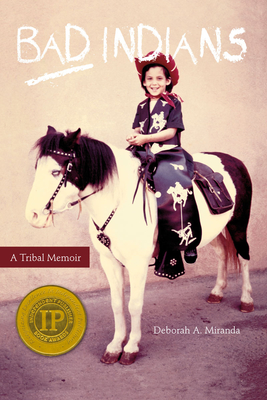Virtual Event with Wendy Call
In this masterful memoir, poet/scholar/activist Deborah Miranda incorporates family photographs, historical documents, actual and invented elementary school assignments, oral history, journal entries, lyric essays, poetry, and a blood quantum chart made into visual art. As author Linda Hogan says, Bad Indians “is groundbreaking not only as literature but as history.” The operating principles of the book are decolonization and survivance*—both key concepts for all U.S. writers as we reckon with history and loss in these pandemic times. The book’s organizational principle is collage—a literary strategy that has gained greater resonance with this decade’s experiences of isolation and fragmentation.
Accompanied by questions to guide your reading and prompts to inspire new writing (see below), Wendy Call’s talk will delve into Bad Indians and how it was made, as well as connecting it to other contemporary literary works by Indigenous authors. *“Survivance”as first employed in the context of Native American Studies by the Anishinaabe cultural theorist Gerald Vizenor in his 1999 book Manifest Manners: Narratives on Postindian Survivance, where he defines the term as “an active sense of presence, the continuance of native stories, not a mere reaction, or a survivable name. Native survivance stories are renunciations of dominance, tragedy and victimry.”
Wendy Call is co-editor of the craft anthology Telling True Stories (Penguin, 2007); author of the award-winning nonfiction book No Word for Welcome (Nebraska, 2011); and translator of In the Belly of Night and Other Poems (Pluralia, 2022) and Nostalgia Doesn’t Flow Away Like Riverwater (Deep Vellum, 2023), both by Indigenous Mexican (Zapotec) poet Irma Pineda. Wendy teaches in Pacific Lutheran University’s MFA program, the Rainier Writing Workshop.
Her nonfiction and translations have been supported by the Fulbright Commission, National Endowment for the Arts, and the local and statewide arts commissions of Seattle, where she lives on unceded Duwamish land. READER’S GUIDE QUESTIONS Make a list of the kinds of material that are included in Bad Indians.
What is the impact on the reader of these varied elements and the collage they create? How does Miranda maintain narrative drive through the book, despite the varied forms she includes: personal essays, poems, anthropological recordings, photos, and newspaper clippings? What makes Bad Indians a “tribal memoir,” as the subtitle tells us, rather than simply “memoir?” How can memoir be collective, rather than an individual story?
Scholarships available Members $30 | General Public $40 (Members: please remember to login to your account before ordering your ticket) This virtual event is streamed via Zoom.



